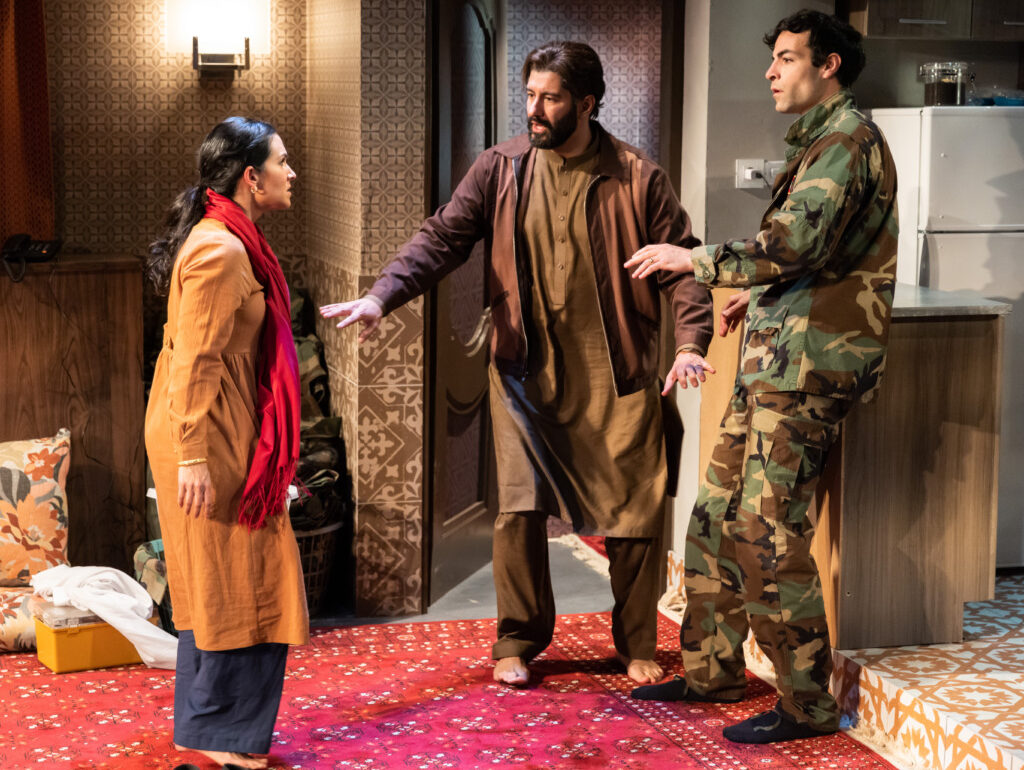The year is 2013. The United States is withdrawing troops from Afghanistan as the Taliban take control; Afghans are fleeing the country.
The year is now 2023. The United States started withdrawing troops from Afghanistan two years ago as the Taliban took control; Afghans are fleeing the country. Again. How can a decade have passed and a harrowing event impacting millions still be happening as if nothing has changed in ten years’ time. In the stunning production of Sylvia Khoury’s Selling Kabul now at Signature Theatre, as a part of the SigWorks: The Heidi Thomas Writers’ Initiative (producing new works by women playwrights with women directors) you see exactly that. The play itself is set and staged in 2013. Except for a brief clip of President Obama on the television screen, it could easily read as the perfect mirror of events happening in present day times. Directed by Shadi Ghaheri, this stunning, suspenseful, and intensely evocative production is an eye-opening experience and a gateway to join the conversation about human rights at a global level.
The nuanced aesthetic of the production is as flawless as both the script and the performers that bring the text to life. Simple and elegant, culturally inviting yet not overbearing in the sense that you find yourself paying more attention to the design elements of the production than you do, as can be the case at times for certain productions. Scenic Designer Tony Cisek has built an astonishing apartment set into Signature’s intimate black-box space of their Ark Theatre creating the dueling illusion of a comforting, lived-in home that also serves as a claustrophobic prison. The functionality of the set is equal parts impressive— running water at the sink, lights and electronics, sparse though they be, that either work on touch-command or are rigged and queued so perfectly that they appear to do so. Lighting Designer John D. Alexander has carefully captured the ambience of internal lighting— particularly that slightly awkward, brighter-than-you-ever-really-expect-it-to-be kitchen light, which seems like nothing but becomes so very intense in one particular moment when it’s flicked on that you as an audience member feel the panic flicker up inside of you just like the characters.
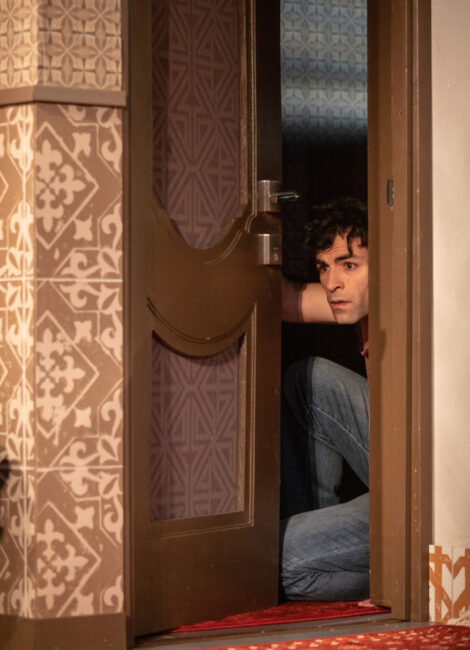
Crafted with respect and reverence to Afghan culture, Costume Designer Moyenda Kulemeka brings notes of beauty to the show’s aesthetic, particularly with the colorful costumes featured on Leyla and Afiya and also with the garish yet gorgeous jade green and fuchsia dress that gets hung in the closet as a talking-point prop. It seems an odd thing to do to praise a sound designer for absence, but Matt Otto’s decision to approach the show’s sound design from a minimalist standpoint is a brilliant one. Less is definitely more in this case; Otto invites the audience to delve deep into the silences of the show; several moments feature just one character on stage experience an intense series of emotions and the temptation would be to underscore those moments with matching emotionally charged sound. The fact that Otto does not give into this temptation is both rewarding and the mark of someone who understands the powerful impact this play and these actors can have on a live audience. The bookend-style sound effects that are featured at the top and tail of the show are executed with simplicity, precision and authenticity.
Director Shadi Ghaheri finds the strenuous momentum that surges beneath the text of Sylvia Khoury’s Selling Kabul and restrains it just enough that it doesn’t completely bowl the audience flat in the first few moments of the play. Leaving the production in its initial setting of 2013 is equal parts harrowing and impressive as it draws light on the ugly truth that these events are still happening ten years later. While the play is a tumultuous explosion of heightened sensations— wildly suspenseful in a way that will have your heart racing nearly the entire production— Ghaheri finds those subtle moments of balance. Amid the darkness, fear, despair and terror, there are shimmering slivers of hope, happiness, and even humor. Once the play sets in motion it races down this perilous hill, growing ever more intense in its suspenseful nature, the stakes growing higher and graver with each passing moment.
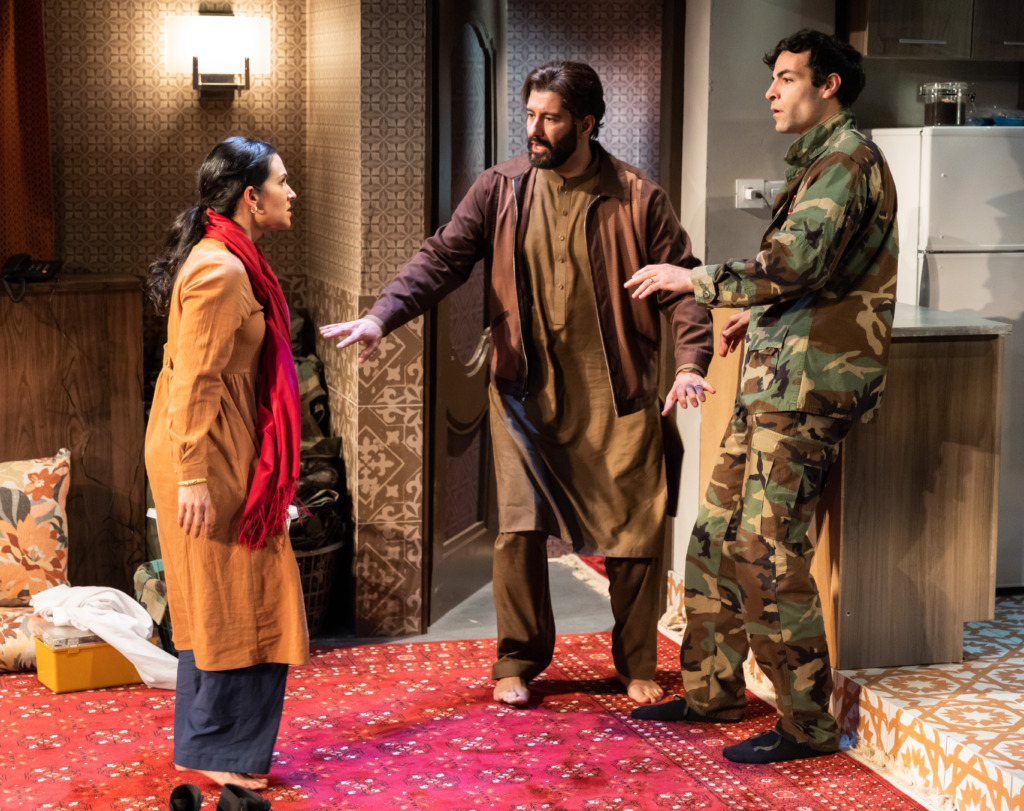
The cast of four— Mazin Akar as Taroon, Neagheen Homaifar as Leyla, Yousof Sultani as Jawid, and Awesta Zarif as Afiya— deliver astonishing, emotionally charged performances that at times leave you breathless with your heart racing and your eyes watering. While there is only one scene towards the end of the production that all four performers briefly share the stage, there is never a moment where they feel unconnected from the gathered world in which their characters exist. The gamut of emotional distress that these actors deliver defies proper description, radiating in a raw and frenetic space of both the mind and the heart, creating an unforgettable, evocatively eviscerating theatrical experience.
Even before words are spoken, Mazin Akar’s Taroon possesses a fidgety restlessness that is ever-present burbling at the surface level, spilling over into his body language, actions, and words. The static version of Taroon is the anxious tiger pacing in a cage. Akar brings an explosive, dynamic version of the character to life. The tensions of these moments shared on stage with the company, guided with such precision by director Shadi Ghaheri has your stomach dropping out every time Akar’s Taroon loses control of his voice and his volume blasts. You find yourself with the terrified urge to shush him because the story is happening in your lap and you’ve become a part of it. The unchecked fury that rages in Akar’s portrayal of Taroon is balanced against a deeply bonded moment shared with Jawid (Yousof Sultani) late in the second act; the humanity of two men simply trying to do their best for those they love, speaks volumes about the show’s overall approach to empathy in the culture being presented.
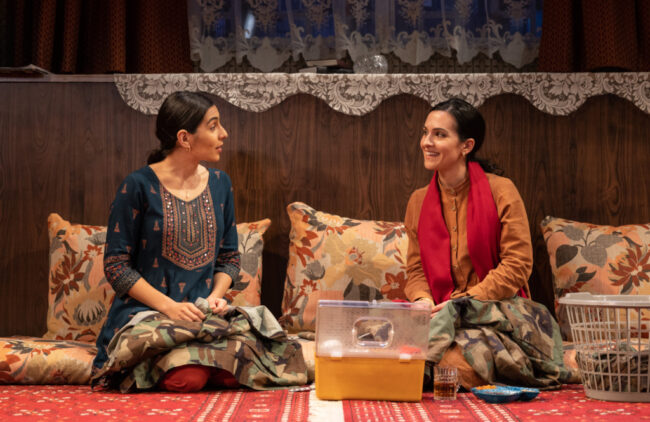
When Leyla (Neagheen Homaifar) first arrives on the scene she’s actually the source of some of the show’s earlier humors. There’s almost the cliché vibe of ‘nosy neighbor who just won’t leave’ and the result is some much-needed laughter, particularly when Jawid returns home making the less-than-subtle insinuations through forced-niceness about how she’s more than welcome to stay (even though it’s painstakingly obvious, to the point of humorous that he wants her to leave.) Homaifar showcases a brief explosion of mercurial proportions flipping from happy-go-lucky, albeit quirky and gossipy, to uncontrolled fear-driven fury on a dime. The harrowing and paralyzing moment where she storms the apartment, threatening both vocally and bodily the character of Afiya is so shocking that you feel almost as if you’ve been slapped by her actions. The versatility she showcases, both in that moment and in her final return as remarkable.
Awesta Zarif’s portrayal of Afiya is sensational. The realness of her terror and moments in pure panic are beyond palpable. Zarif manages to take the heightened emotional chaos that is pulsating through her character and transform it into an entity that permeates the entire play space, filling the room like a fifth character. When you watch her on stage it’s like watching a woman trying to balance the precarious situation of harboring her fugitive brother in her house while her husband works for the men that her brother is hiding from and seeing a physical manifestation of worry, fear, panic, and anxiety balled up into a shadow-woman that hovers just beside her at all times. With telling eyes that give even greater access to the emotional maelstrom brewing inside of the Afiya character, Zarif portrays so much more than just a scared and nervous woman in a situation far beyond her control. There is a strength and determination roiling beneath everything else, which never falters and in one simple gesture at the very end of the production as her character approaches the window— is displayed triumphantly. Zarif is gives a performance beyond praise-able words.
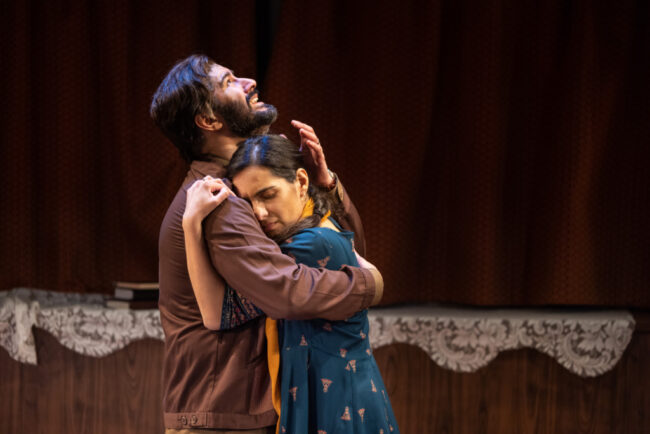
One of the most jarring, heartbreaking, and utterly emotionally eviscerating moments in the production arrives in a single, textless moment with Jawid (Yousof Sultani) on stage alone. Sultani is alone in the main room of the apartment having just frantically retrieved something hidden from some place of concealment and the internal emotional war of the Jawid character explodes in a raw, harrowing inferno all over Sultani’s face, all throughout his body, and radiates in waves out over the stage as he lets the character come to his knees on the floor. It’s evocatively brutal and simultaneously beautiful. The humanity that Sultani manages to bring to the character of Jawid, revealed particularly during the bonded-conversation moment with Taroon late in the play, is phenomenal. Each of the four company members does a stellar job in creating dynamic, lively portrayals; Sultani delivers perhaps the most breathtaking one of all. Sultani’s portrayal of Jawid is a jarring, emotional experience beyond compare. The balanced reservation of culture, place in the home, and tradition stacked against the need to love and protect his wife is more moving than can accurately be described with words.
Selling Kabul will literally keep you on the edge of your seat straight through the final moment of the play. The tensions never stop building. The stakes never stop escalating. There are several moments when you find yourself gasping, or desperately about to shush Taroon for making his voice too loud because everything that’s happening on stage is happening at such a visceral, real level that you feel as if you’ve become a part of the intense situation. It’s an extraordinary conversation starter; what do you do to protect your family and your loved ones? How far will you go? What is the best course of action when you live in a country that no longer recognizes basic human rights? A must-see production, Selling Kabul is a powerful performance that will linger within your heart and your mind long after it closes at Signature Theatre.
Running Time: Approximately 1 hour and 45 minutes with no intermission
Selling Kabul plays through April 2, 2023 in the Ark Theatre at Signature Theatre— 4200 Campbell Avenue in Arlington, VA. For tickets call the box office at (703) 820-9771 or purchase them online.
To read the interview with Yousof Sultani, click here.

